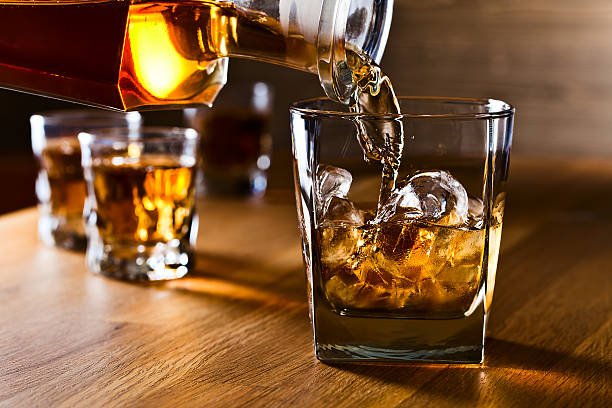Does Alcohol Raise Body Temperature? Drinking too much alcohol can cause various problems, and one of them could be a high body temperature. Alcohol can make you feel sick in different ways, and these problems could indicate a bigger issue.
Check Out Now
Can Alcohol Cause a Fever?
It is generally asked; does alcohol raise body temperature? Drinking alcohol might make you feel warm, but it usually does not raise your body temperature. In fact, it often lowers it. So, getting a fever just from alcohol is unlikely.
However, research shows that alcohol can make it harder for your body to regulate its temperature. When combined with other factors, this could result in a fever.
Although drinking alone does not usually cause a fever, there are related situations where it might happen. For example, after heavy drinking, you might wake up with hangover symptoms, including a feeling of having a fever.
In this case, you might feel tired, and your body temperature could be slightly elevated. However, it would not be high enough to be considered a fever (which is typically over 99 degrees Fahrenheit).
Lastly, if you have been drinking heavily for a long time and then cut back or quit, you might experience alcohol withdrawal. This can bring about several symptoms, including fever, chills, fatigue, and trembling.
What to Do When You Have a Hangover Fever?
When you drink too much and wake up with a hangover, you might feel a lot of discomfort. The most common hangover signs are headaches, difficulty focusing, and feeling tired.
Read Now: What is the best way to detox your body in 24 hours?
As your body tries to get rid of the alcohol, you might also become dehydrated and have low blood sugar. These conditions can cause additional problems and can be risky, so it is important to take care of your health.
Check Out Now
How to Feel Better from a Hangover Fever?
If you have a hangover, especially with a fever, you can do a few things to help your body get back to normal:
- Drink plenty of water to hydrate yourself.
- Take electrolytes, which help absorb water faster and balance your body.
- Use pain relievers like Tylenol or Advil to ease headaches and lower the fever.
- Check your blood sugar levels and have glucose if they are low. Talk to a doctor to find out why you have low blood sugar.
- Avoid more alcohol, and do not drink coffee or caffeinated drinks, as they can make you more dehydrated.
- Take extra vitamins to boost your immune system. Alcohol can make your immune system react, which may contribute to the fever.
Having a mild hangover is normal after drinking, but if you regularly have severe hangovers, you might be drinking too much and straining your body. You may also be mistaking alcohol withdrawal symptoms for hangover signs.
Alcohol Hangover vs. Alcohol Withdrawal
Does alcohol raise body temperature? A hangover and alcohol withdrawal are not the same thing, even though their effects can seem similar. They happen for different reasons in your body.
A hangover usually lasts for 8-24 hours, and the symptoms are strongest when your blood alcohol levels go back to zero.
The symptoms of a hangover can include:
- Feeling very thirsty
- Having a headache
- Muscle pain
- Feeling weak
- Feeling sick
- Being tired
- Feeling dizzy
- Being sensitive to light and sound
- Having high blood pressure
- Feeling cranky
- Sweating
- Feeling anxious
Check Now: How to get high without drugs?
Alcohol withdrawal symptoms are not just uncomfortable, but they can also be very dangerous. They can affect your body temperature and make you feel like you have a fever. Other common symptoms of alcohol withdrawal include shaking, sweating, anxiety, high blood pressure, and a fast heartbeat. Some people may even have seizures or see things that are not there (hallucinations).
Alcohol withdrawal happens when someone who is physically dependent on alcohol stops drinking or reduces their drinking.
At first, it might feel like a really bad hangover, but these symptoms can last much longer, sometimes for days or weeks, depending on how much alcohol a person used to drink. It is important to get medical help to prevent the body from going into shock.
Check Out Now
How to Seek Help for Alcohol Addiction?
Alcohol addiction, also known as alcohol use disorder, is a serious problem that can affect anyone, no matter their age or background. It’s possible to develop a drinking habit in just a few weeks or months, and it can quickly spiral out of control.
Once you start drinking regularly, your body can become dependent on alcohol.
Being physically dependent means that suddenly stopping drinking is not safe or recommended. If you try to quit on your own, you might experience uncomfortable and potentially dangerous symptoms like seizures and seeing things that are not there (hallucinations).
That is why it is highly recommended to seek alcohol addiction treatment with a team of medical experts.
With the right support, you can overcome alcohol addiction and stay sober in the long run. It is important to choose the right team of doctors to help you on this journey.
Read More: Does Alcohol Raise Body Temperature?- Is Alcohol a Stimulant or Depressant?
- Is Tequila a Stimulant or Depressant?
- Liquid Marijuana Drink Recipe
- Is Alcohol A Drug?
- Does Alcohol Raise Body Temperature?
- Bloated From Alcohol: Why It Happens & Should You Be Concerned?

I am a passionate technology and business enthusiast, constantly exploring the intersection where innovation meets entrepreneurship. With a keen eye for emerging trends and a deep understanding of market dynamics, I provide insightful analysis and commentary on the latest advancements shaping the tech industry.
